Signatories on Banco de Hidalgo notes
Gerente
|
He signed notes dated up to 6 June 1903. |
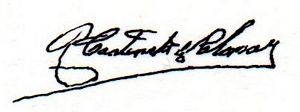 |
|
Eduardo del Raso took over as manager from Castañada y Palomar in May 1908The Mexican Herald, vol. XXVI, no. 75, 14 May 1908: El Tiempo, 19 May 1908. In April 1916 he was appointed as manager of the new Comisión Monetaria El Pueblo, Año III, Tomo I, Núm. 546, 30 April 1916 and later, on 1 April 1919 was made the government’s financial agent in New YorkEl Porvenir, Núm. 1,062, 2 April 1919. The next year he became manager of a new Mexico City bank, the Compañia General de Crédito, S. A.Report of Trade Commissioner C. H. Cunningham, Mexico City, 6 July 1920. The bank was to be capitalised at $500,000, half subscribed by Rafael Nieto and half by R. P. Jennings, an American capitalist, and located at calle Capuchinas núm. 40. He signed $5 notes dated 23 September 1902 and then from 1903 to 1914. |
 |
Consejero
|
Agustín Inurritegui was born in 1842 in Legazpi, in the Basque district of Spain, and emigrated to Mexico in the 1850s. He settled in Pachuca where he worked with another migrant from Legazpi, José Maquivar. In 1891 he was a founding member of Maquivar y Compañía. He died in 1908Silvia Guadalupe Ubilla Montiel, Inmigrantes españoles en Pachuca (1866-1911): redes de parentesco, matrimonio y ocupación. Tres estudios de caso (José Maquivar, Agustín Inurritegui y Lorenzo Maquivar), UNEH, Pachuca, 2013 He signed notes dated 1902. |
 |
|
Lorenzo Maquivar was born in 1866. In 1891 he joined his own brother José and Agustín Inurritegui in José María Maquivar y Compañía that ran a grocery and service company on calle Hidalgo. By 1904 Lorenzo Maquivar and Agustín Inurritegui were in Maquivar y compañía, Sucesores located in the Portales of the Plaza Constitución and now selling groceries, wines, building materials, glassware, hardware and haberdashery. He died in 1948Silvia Guadalupe Ubilla Montiel, Inmigrantes españoles en Pachuca (1866-1911): redes de parentesco, matrimonio y ocupación. Tres estudios de caso (José Maquivar, Agustín Inurritegui y Lorenzo Maquivar), UNEH, Pachuca, 2013. |
 |
|
In 1884 Jaime Bennetts was agent for the Banco Nacional de México in PachucaEl Siglo Diez y Nueve, Novena Epoca, Año, XLIV, Tomo 86, Núm. 13,953, 18 October 1884. He signed notes dated 1902. |
 |
|
He signed notes dated from 1902 to 1907. |
  |
|
Carlos Sánchez Mejorada Domínguez was born in Pachuca on 2 December 1883. He died on 24 June 1952, in Mexico City, at the age of 68. He was the legal representative of the Compañía Explotadora de Minas from 1914 to 1918. He signed notes dated from 1902 to 1910. |
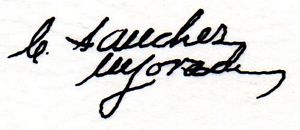 |
|
Honey married Emma Jane Phillips, another Cornish immigrant and had four sons and five daughters. His main residence was in Mexico City, where he founded the Jockey Club. He also founded the Reforma Athletic Club in Pachuca. During an illustrious career Honey was on the board of three state banks (this Banco de Hidalgo, founded in 1902, El Banco de Querétaro, founded in 1903 and El Banco de Guerrero, founded in 1906). He was also president of an iron and steel works, two mining companies, a paint factory and was a director of two railway companies, the Ferrocarril Nacional Mexicano and the Ferrocarril de Pachuca-Tampico. Honey was known for the treatment of his workers, including always paying 25 centavos a day when the minimum wage was 18 centavos, and his humanitarian efforts to help the indigenous population. He signed notes dated from 1904 to 1914. |
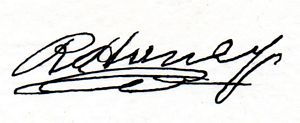 |
|
Burgos was appointed sub-manager of the Banco Internacional é Hipotecario in October 1903El Tiempo, 10 October 1903. In December 1918 Burgos was appointed (along with Luis Cabrera and Rafael Nieto) to the new board for the Ferrocarriles ConstitucionalistasEl Pueblo, Año IV, Núm. 1487, 5 December 1918. He signed notes dated from 1905 to 1914. |
 |
|
Warner McCann was an American from San Francisco who finally settled in Mexico in February 1903The Mexican Herald, 1 February 1903. With his brothers, Ferdinand and Frank G., he formed McCann Hermanos and was a mining engineer and investor. By 1907 he was manager of the Hacienda San Francisco in Pachuca and was upgrading it with the installation of a 75 horsepower motor and transformers for the driving of compressor, tube mill, etc.The Mexican Herald, vol. XXIV, no. 105, 14 June 1907. In 1909 he was general manager of the San Francisco mill and the Progreso hacienda in PachucaThe Mexican Herald, vol. XXIX, no. 101, 10 December 1909. The McCann brothers were investors in the Tehuana Mining Company, which had silver/gold mines near Totolapa, Oaxaca, with Ferdinand as vicepresident and Warner as comisario suplenteThe Mexican Herald, vol. XXVI, no. 47, 16 April 1908. The brothers also owned a hacienda located in Zumpango, Estado de México, which was expropriated sometime during the revolutionDecision no. 510 of Special Mexican Claims Commission, Department of State, 1940. Warner signed notes dated 1910. |
 |
|
Thomas Phillip Honey was born on 4 March 1878, in Ixmiquilpan, Hidalgo, the son of Ricardo Honey (supra). Honey was also on the board of the Banco de Guerrero and, during the revolution, signed notes issued by the Compañía de Minas la Blanca y Anexas and the Compañía Minera y Beneficiadora Maravillas y San Francisco. He died on 7 March, 1957, in Mexico City, at the age of 79. He signed notes dated in 1913 and 1914. |
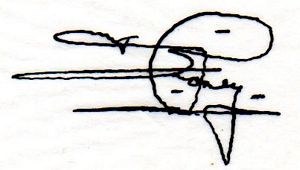 |
|
On 4 January 1907 Northey was one of the founders of the Mexico City stock exchange, la Bolsa de México, S.A.. He was also a shareholder of the Pachuca Mining Company Limited, whose properties were adjacent to the properties of the Santa Gertrudis y Guadalupe Mining Company, the Real del Monte y Pachuca Mining Company, the Sonora y Ures Mining Company, Blanca y Anexas Mining Company, and others, and was elected treasurer at the 1909 AGMThe Mexican Herald, vol. XXVII, no. 134, 13 January 1909. In April 1913 Northey was reported to be in New Orleans to buy arms and ammunition for Felix Díaz’ attempt to oust Huerta. In September 1916 he was advertising his company, Hermosillo, Northey & Cía., which he formed with José Hermosillo and M. de la C. Escamilla, as financial agents (ACCIONES Y CAMBIOS. – COMERCIO Y BANCA.)El Demócrata, 10 September 1916. He died on 5 March 1959, in Cuautla, Morelos, at the age of 81. |
 |
| José Calero |  |
|
In 1935 a Rafael M. de Arozarena owned the Fracción de la Hacienda de ZupitlanPeriódico Oficial, Tomo LXVIII, Núm. 35, 16 September 1935.
|
 |
| [identification needed] |  |
Interventor
|
He was appointed Interventor on 29 July 1902Diario del Hogar, Año XXI, Núm. 245, 29 July 1902 and signed notes dated from 1902 to 1905. He died on 12 September 1933. |
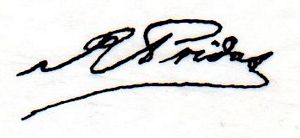 |
|
J. D. Fernández Fernández signed $500 notes dated 5 February 1907. |
 |
|
Roberto Maass He signed notes dated from 1910 to 1914. |
 |


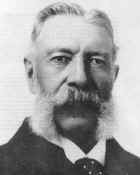
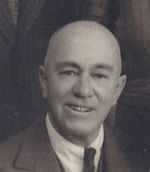 Pablo (Paul) Northey was born on 1 July 1877, in La Bonanza, Hidalgo, to English parents. He married Catherine Margaret Honey on 25 December 1900.
Pablo (Paul) Northey was born on 1 July 1877, in La Bonanza, Hidalgo, to English parents. He married Catherine Margaret Honey on 25 December 1900.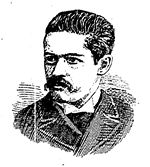 Ramón Prida y Arteaga was born in Mexico City on 23 February 1862. He was a lawyer and journalist.
Ramón Prida y Arteaga was born in Mexico City on 23 February 1862. He was a lawyer and journalist.